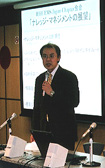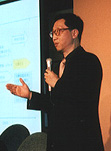IEEE EMS Japan Chapter Meeting: Summary
Takahiro MIYAO (Professor, GLOCOM, and Head, Japanese Institute of Global Communications)
| [IEEE EMS Japan Chapter Meeting] |
| Overview of Knowledge Management |
| Date/Time: | March 5 (Friday) 14:00-17:00 |
| Place: | GLOCOM, 6-15-21 Roppongi, Minato-ku, Tokyo |
| Moderator: | Hajime Yamada (Deputy Director, GLOCOM, and Professor, Toyo University) |
| Program: |
Opening Remarks:
Hiroshi Suzuki (Chair, IEEE EMS Japan Chapter)
Presentation 1:
Yoon Taesung (Open Knowledge)
“New Trends in Knowledge Management”
Presentation 2:
Akio Kameoka (JAIST)
“From JIT Production to JIT Innovation”
Presentation 3:
Hiroshi Suzuki (GE Energy)
“An Example of Management of Technology”
Concluding Remarks:
Hajime Yamada (Vice-chair, IEEE EMS Japan Chapter)
|

IEEE (Institute of Electrical and Electronics Engineers) EMS (Engineering Management Society) Japan Chapter held an annual meeting for EMS members at GLOCOM in Tokyo on March 5, 2004. About 60 members, a majority of the Chapter members, attended the meeting.
After a brief introduction by Prof. Hajime Yamada (Vice-chair of IEEE EMS Japan Chapter) as the moderator of the meeting, Mr. Hiroshi Suzuki (Chair of the Japan Chapter) gave his opening remarks, in which he said that EMS activity has been growing in recent years and this kind of meeting for EMS members can now be organized by EMS itself at least once a year, thanks to members' cooperation. One of this year's policy agendas, according to Mr. Suzuki, is to attract young engineers to EMS so as to energize discussions on knowledge management and management of technology.
 In the first presentation, Mr. Yoon Taesung (Open knowledge) talked about new trends in knowledge management, where knowledge management concerns the interface process which lies between the process of knowledge decomposition and the process of knowledge integration, and it also involves knowledge exchange within and/or between organizations. He emphasized the importance of knowledge evolution in the sense that relations among various kinds of information and knowledge are constantly evolving and developing, a fact that should always be taken into account to management technology and innovation effectively. Another important point is the role of knowledge designers to work between knowledge users and knowledge builders, where knowledge designers are analogous to building designers who should identify users' need and design appropriate knowledge systems to be constructed by builders. In the first presentation, Mr. Yoon Taesung (Open knowledge) talked about new trends in knowledge management, where knowledge management concerns the interface process which lies between the process of knowledge decomposition and the process of knowledge integration, and it also involves knowledge exchange within and/or between organizations. He emphasized the importance of knowledge evolution in the sense that relations among various kinds of information and knowledge are constantly evolving and developing, a fact that should always be taken into account to management technology and innovation effectively. Another important point is the role of knowledge designers to work between knowledge users and knowledge builders, where knowledge designers are analogous to building designers who should identify users' need and design appropriate knowledge systems to be constructed by builders.
In the second presentation, Mr. Akio Kameoka (JAIST), who was not physically present but appeared in his video, focused on the role of roadmapping in management of technology in the transition period from the past linear incremental innovation model to a future nonlinear innovation model, which might be regarded as a market tool for product innovation with the effective use of clear milestones. Mr. Kameoka said that the next-generation innovation model involves market creation by introducing new service concepts, and science and technology will converge in the near future, where roadmapping plays a crucial role and, therefore, should be shared among various organizations, including business corporations and academic institutions. This period might be called the age of techno-producers who create concepts for management of technology, Our challenge is to move from Just-In-Time production to Just-In-Time innovation, which is made possible by techno-producers with strategic roadmapping.
 In the third presentation, Mr. Hiroshi Suzuki (GE Energy) took up GE as an example of the U.S. style of management of technology. Especially important is human resource management, where leaders are drivers for innovation, and all employees are trained to be leaders. Another important factor is transparency in governance with special emphasis on compliance, independent board, leaders' obligations, etc., backed by well-established and innovative corporate culture. Mr. Suzuki also explained GE's strategy in Asia, where the development of intellectual properties, business growth and low cost operation are combined in relation to management of technology. In the third presentation, Mr. Hiroshi Suzuki (GE Energy) took up GE as an example of the U.S. style of management of technology. Especially important is human resource management, where leaders are drivers for innovation, and all employees are trained to be leaders. Another important factor is transparency in governance with special emphasis on compliance, independent board, leaders' obligations, etc., backed by well-established and innovative corporate culture. Mr. Suzuki also explained GE's strategy in Asia, where the development of intellectual properties, business growth and low cost operation are combined in relation to management of technology.
Lively discussions followed these presentations. Finally, announcements were made by Prof. Hajime Yamada about (1) PICMET '04 Symposium in Seoul, Korea on August 1-4, 2004, (2) IEMC Meetings in Singapore on October 18-21, 2004, and (3) another meeting of the Japan Chapter and related symposium later this year.
|





